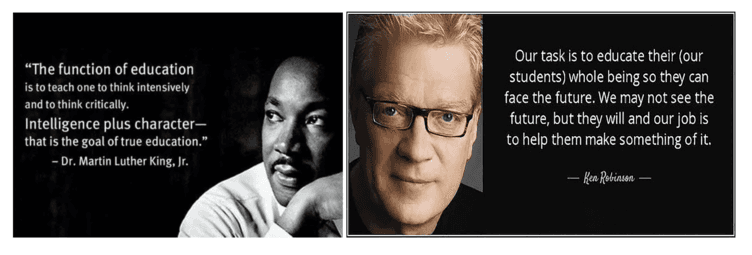Parenting
When “timeless” ideologies met
Sudha Shankar
•
Mar 11, 2023
Dr. Martin Luther King Jr. (1929 - 1968) believed that education should go beyond its focus on academic knowledge to character development and the cultivation of moral values. In his famous speech "The Purpose of Education," Dr. MLK Jr stated that education must go beyond acquiring knowledge and should also help individuals develop a sense of dignity, self-respect, and a commitment to social justice. He believed that education should empower individuals to make positive changes in their communities and work towards a more just and equitable society. Dr. MLK Jr also believed that creativity and critical thinking in education would be crucial to help solve some of the complex problems of the world.
Sir Ken Robinson (1950 - 2020) championed the importance of creativity and innovation in education. Sir Robinson believed in a more holistic approach to education that valued creativity, critical thinking, and individual talents and strengths. Sir Robinson believed that the traditional educational system needed to move away from standardized testing to foster creativity and innovation. Sir Robinson strongly believed that educational systems should encourage students to explore their passions, develop their unique talents, and think creatively to solve problems. Sir Robinson was also an advocate for developing a broad range of skills, including emotional intelligence and financial literacy, in addition to academic knowledge. He believed that these skills are essential for success in the 21st century and beyond, where rapid technological change and economic uncertainty require individuals to be adaptable and resilient.
Both Sir Ken Robinson's ideas and Dr King's ideas highlight the need for a more holistic and inclusive approach to education that values creativity, critical thinking, and individual strengths. They placed a strong emphasis on the importance of a holistic approach to education that values character development, moral values, and the cultivation of creativity and critical thinking skills. They believed that education “should empower individuals to make positive changes in their communities and work towards a better world for all.”
Both critical thinking and character building help children in pursuing academic excellence and in shaping their personalities, enabling them to become responsible, well-rounded adults.
Critical thinking allows children to question assumptions, think independently, make connections between different ideas, construct opinions based on evidence and reasoning, and develop innovative solutions to problems.
Character building helps children understand the consequences of their actions and develop a sense of accountability for their choices, thereby acting as a strong foundation and a moral compass in the development of children.
Character-building and Critical thinking skills help children become more resilient, adaptable, and successful in life. These skills help children develop a strong moral compass and the ability to make informed decisions based on their values. These skills also help prepare children for the challenges of the future (21st century and beyond), where they will need to think critically and make responsible decisions in a fast-paced and ever-changing world.

